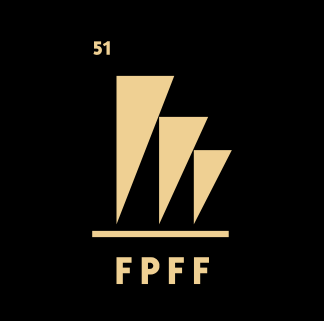The Pit
A young sales department manager jogs after work to relax. She runs and
falls into a deep hole. This becomes the beginning of an absurd epic
journey...
The film is a metaphorical commentary to the changes brought about by the economic crisis. It talks about gaining a new perspective, which makes it possible to verify the priorities held so far.
The film is a metaphorical commentary to the changes brought about by the economic crisis. It talks about gaining a new perspective, which makes it possible to verify the priorities held so far.
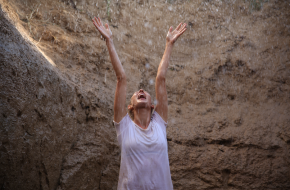
The Shout
Released from prison, Marianna wants to begin a new life, cut off from
the family Praga district, from the home with her constantly drunk
mother and her bothersome common-law spouse. Work at an old people's
home and the relationship with the nurse Marek is a chance for her. The
girl begins to believe in a new beginning which is to be heralded by a
new flat. However, the keys to the dream flat and a better life are out
of the reach of the protagonists. What they are left with is anger,
helplessness and shout.
The third part of an informal trilogy by Barbara Sass, with Dorota Stalińska in the main role. Dramatic clashes, emotional tone and another expressive protagonist. One of the most interesting film comments on the '81 events and the unresolved problems of the "season of freedom".
The third part of an informal trilogy by Barbara Sass, with Dorota Stalińska in the main role. Dramatic clashes, emotional tone and another expressive protagonist. One of the most interesting film comments on the '81 events and the unresolved problems of the "season of freedom".
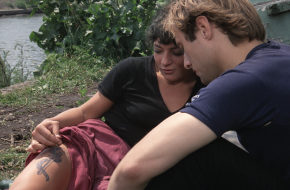
The Singing Napkin
The first feature-length film in the history of Polish artistic education system that is a diploma of the fourth-year students of the Acting Department of the Łódź Film School. The film consists of four independent parts: Kazan about a painful initiation process; Narkolovestory about an escape into drugs and about love which makes it possible to survive the worst; Pancakes (with sugar) about the effort of being parents under the pressure of reality; The Singing Napkin about the power of love - a visionary, poetic adaptation of a Greek fable.
The parts are joined by means of documentary fragments of the auditions and a frenetic surreal dance finale, inspired by Bollywood cinema.
The parts are joined by means of documentary fragments of the auditions and a frenetic surreal dance finale, inspired by Bollywood cinema.

The Swimming Pool
Karol Selznik is a regular at the swimming pool. He swims as many
lengths of the pool as many years he’s lived. Forty-three. That’s enough
to think through problems, relieve stress. But recently Selznik has
been having a nightmare. He runs from somebody or something. At the last
moment he manages to jump into a deep pool, which turns out to be a
trap. Luckily, it’s only a bad dream. At least until the day Selznik
notices his new neighbours.

The Test
How to develop your career quickly and secure popularity you dream of? A
visit to the Success and Fame Potential Research Institute might come
in handy. That’s where Ana Sis, a young actress turns to. Ana undergoes a
test to assess her marketing potential. However, every next trial
requires her to sacrifice more and more. Will she make it till the end
of the test?
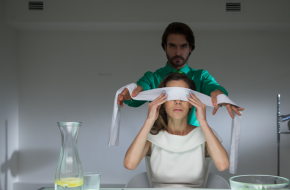
The Touch of an Angel
Was there an alternative scenario of the Holocaust? Was it possible to save thousands of Jews from Silesia before the concept of the cruellest death camps appeared? Would history have taken another course, if the western world had not shockingly turned a blind eye to the fate of Jews? Henryk Schoenker, the son of the last leader of the Jewish Community in Oświęcim, reveals an unknown history. Before the idea of the Auschwitz-Birkenau camp was born, an Office of Jewish Emigration to Palestine was established in the town...
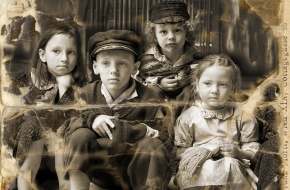
The vanquishing of the witch Baba Yaga
Jessica Oreck’s strange and beguiling film, one of the highlights of
MoMA's New Directors/New Films 2014, combines Eastern European storybook
animation with documentary and fiction elements to recount the Slavic
fable of the witch Baba Yaga, a frightful character living in a woodland hut perched on chicken legs. In Baba
Yaga, as with her previous documentary hybrids, Aatsinki: The Story of
Arctic Cowboys and Beetle Queen Conquers Tokyo, Oreck is fascinated by
the rituals, superstitions, and fables of diverse subcultures. In the
case of Baba Yaga, Oreck focuses especially on
the contemporary relevance of childhood stories to war and social
upheaval; memory and trauma; and our relationship with the natural
world, the threat we pose to that world, and the threat that world poses
to us.

These Daughters of Mine
A warm tale about family relationships. A bitter-sweet story of two
sisters who have to join forces despite their mutual dislike when faced
with a difficult life situation. Marta is successful. She’s a renowned
actress, a star of popular series. In spite of her fame and money she
still can’t find her way in life. She raised her now already grown up
daughter on her own. In contrast to her strong and dominating elder
sister, Kasia is sensitive and has a tendency towards exaltation. She
works as a teacher. Her marriage is far from perfect, her husband is a
loser constantly trying to find a job. There’s no great love between the
sisters but their mother’s sudden illness forces them to act together.
They have to take care of their beloved but despotic father. Marta and
Kasia gradually become closer to each other and regain their lost
relationship, which gives rise to a series of tragicomic situations.

